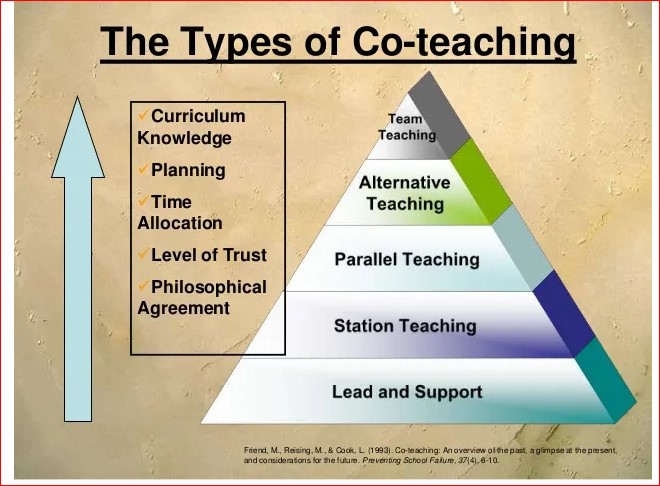Co-Teaching: Tips And Strategies To Build Successful Relationship With Co-Teacher
31st May 2024

You suddenly learn that you need to be working with a co-teacher at the beginning of your academic year, how do you feel? It may be your first attempt at co-teaching, or perhaps the last attempt didn't go as planned. Regardless of whatever your scenario is, here are a few tips to build a strong relationship with a co-teacher to create an inclusive and supportive environment for all your students to succeed. Once you get into a rhythm, you'll see how valuable having another team member can be.
What Is Co-Teaching?
A general education class that is co-taught by two or more teachers is called co-teaching. It usually indicates that the students in your classroom should have a special education or ELL teacher. Special education children are often supported in the regular education classroom rather than removed from it.
What Is Your Role In Co-Teaching?
You must learn how to use co-teaching in your classroom before you can even begin. Having this discussion is important since it will clearly define each teacher's responsibilities. From there, you need to have a clearer understanding of what is expected of you in the role.

The following are models of typical co-teaching relationships:
- One Teacher, One Assistant
While the lesson is being taught by one instructor, the other is helping the kids.
- One Teacher, One Observer
While the other instructor watches, one teacher instructs the class.
- Station Teaching
Students rotate between teachers, receiving various chunks of the same lecture from each one.
- Parallel Teaching
Two groups get the same instruction from the divided class.
- Alternative Teaching
Co-teachers teach a small group of students apart from the instructor.
- Team Teaching
Both the teacher and the co-teacher give instructions to the class.
- Platooning
Although they work together and prepare differently, teachers teach distinct subjects in various classrooms.
Do you follow us on Social Media? If not, then you’re missing out on a lot of informative content. We regularly share upgraded educational content, tips, feedback, and more. Check us out by clicking the profiles here - Facebook / Twitter / LinkedIn / Pinterest / Instagram / YouTube
6 Strategies For Working With A Co-Teacher
Here are some things to think about while collaborating with another educator. Try these suggestions for more success:
1. Define Your Role Clearly
Setting up distinct responsibilities and duties for each co-teacher is one of the first steps toward co-teaching effectiveness. This keeps things clear and ensures that the two educators are pursuing the same objectives.
Roles might be split according to student requirements, interests, or areas of competence. It takes regular cooperation and discussion to refine and modify these responsibilities as necessary.
2. Foster Communication And Trust
Effective co-teaching partnerships are built on a foundation of open communication and trust. Co-teachers ought to provide a courteous and encouraging atmosphere wherever they may freely exchange concepts, worries, and tactics.
This entails offering constructive criticism to other teachers and being open to receiving input from your peers. Although it takes time and work to establish confidence, the success of the partnership depends on it.
3. Leverage Each Other’s Strengths
Each teacher has special talents and knowledge to offer. Co-teaching offers a chance to make use of these advantages for every student. Determine the areas of expertise of each co-teacher and devise strategies to integrate them into the lesson plan.
For instance, a teacher who is particularly skilled at integrating technology into the classroom might take the initiative to include digital tools in instruction. Co-teachers can provide pupils with a more thorough educational experience by using each other's abilities.
4. Develop A Collaborative Culture
Collaboration in a co-teaching classroom involves the students as well as the teachers. Create a collaborative learning environment in the classroom where students are inspired to cooperate, exchange ideas, and aid in one another's education.
Group projects, cooperative learning exercises, and organized peer communications can all help achieve this. Co-teachers may provide a supportive and inclusive learning environment where all students feel appreciated and supported by encouraging student collaboration.
5. Embrace Adaptability And Flexibility
Co-teaching requires flexibility because no two days are the same in the classroom. Co-teachers need to be ready to modify their lesson plans and teaching methods in response to changing student needs and classroom dynamics.
This might entail making last-minute changes to lesson plans, tweaking teaching methods, or giving certain pupils more help as required. Adopting a flexible approach enables co-teachers to adapt skillfully to evolving situations and guarantee that every student receives the assistance required for success.
6. Seek Professional Support And Development
Sustaining co-teaching techniques and conquering obstacles requires ongoing professional growth. It is recommended that co-teachers look for professional development opportunities, workshops, and materials designed especially for cooperative learning.
They can also gain from interacting with other co-teachers to exchange best practices, tactics, and experiences. Creating a support system among coworkers can help teachers improve their practice by offering helpful advice and motivation.
Plan Together With Your Co-Teacher
Teachers may work together and serve the various needs of their students in the classroom by participating in co-teaching. Co-teachers can succeed in their collaborative efforts by defining clear roles and adapting flexibility at all times. Additionally, you can break free from the traditional classrooms and build a more inclusive one by enrolling yourself in Special Education Courses Online.
We believe education should be accessible for everyone. That’s why we don’t charge for our blogs. Find the right course that will help you in your career with us, contact us at 1800–212–6400. You can mail us at act@asiancollegeofteachers.com
Written By: Sonal Agrawal